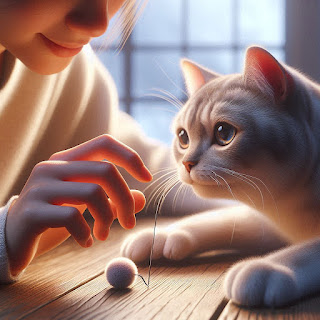Why Does My Cat Lick Me Then Bite Me? Unraveling the Quirks of Feline Affection
Cats are quirky little creatures with their own unique ways of showing affection. If you've ever experienced the peculiar phenomenon where your cat licks you and then suddenly gives you a gentle (or not-so-gentle) bite, you might be wondering what it all means. Fear not—this behavior is more common than you might think, and there's a lot to unpack about your cat’s mixed signals. Let’s explore why your cat might be switching from loving licks to sneaky nibbles!
The Love-Bite Ritual: Why Do Cats Do It?
Affection Overload
Cats have their own ways of expressing love, and sometimes they just get a little too excited! Your cat might be licking you to groom and bond with you, a behavior they learned from their mom when they were kittens. When they bite, it could mean they're overwhelmed with affection and just don’t know how to contain it. It’s their way of saying, "I love you, but I need a little space!"Playing with You
Cats are natural-born hunters, and playtime often mirrors hunting behavior. When your cat licks and then bites, it could be their playful way of engaging with you. Just like they might with other cats, they may see you as part of their family and want to involve you in a bit of harmless (or sometimes painful) play.Marking You as Theirs
Another reason for the lick-then-bite combo is that your cat may be marking you as their territory. When cats lick, they’re actually spreading their scent. That little bite afterward might be a way of reinforcing their ownership, letting other cats know that you belong to them!Communicating Boundaries
Sometimes, licking and then biting is your cat’s way of saying, "I’ve had enough." Cats can be very sensitive to petting, and this behavior could signal they’re feeling a bit overstimulated. A quick nip might be their way of asking for a break, especially if they’re not quite comfortable in the moment.
Understanding Your Cat’s Body Language
Tail Language
Watch your cat’s tail for clues. A tail that's gently swishing back and forth might mean they’re content, but a flicking or thrashing tail is a sign that they're getting irritated and might bite soon.Purring and Ear Movements
Purring is generally a sign of happiness, but it’s not always the case. If your cat is purring while licking but suddenly flattens their ears, they might be reaching their limit and are about to bite. Ears that are tilted sideways or pinned back often mean that it’s time to give your kitty some space.Relaxed or Tense Body
Pay attention to your cat’s overall body posture. If they’re relaxed and snuggly, you’re in the clear. But if their body suddenly tenses up, that’s a sign they’re ready to pounce—or bite! Recognizing these signals will help you avoid bites in the future.
How to Respond to Your Cat’s Lick-Bite Habits
Set Boundaries
If the biting is too much, gently discourage your cat by moving away. Try redirecting their attention to a toy to help them release their energy in a playful and non-painful way.Create Positive Associations
Reward your cat with treats or affection when they behave gently. This can help them associate positive reinforcement with non-biting behavior.Observe and Adjust
If your cat licks and bites frequently, observe any patterns. Do they do this when you pet them for too long? Or maybe it’s when they’re feeling playful? Understanding their triggers can help you manage their behavior better.
When to Seek Help
While lick-biting is often just a quirky trait, excessive biting could be a sign of an underlying issue like stress or anxiety. If your cat’s behavior suddenly changes, or if their bites are aggressive and frequent, consider consulting with a veterinarian or a feline behaviorist. They can help you determine if there’s something more serious at play.
By understanding why your cat licks and bites, you can foster a better bond and enjoy a more harmonious relationship with your furry friend. Embrace your cat’s unique personality, and remember—every little nibble is just another way of saying, "I love you in my own way!"


.png)










